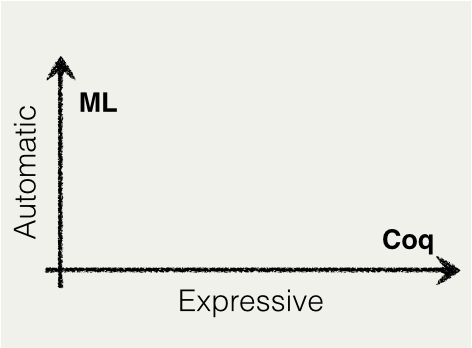Termination {#termination}
==========================
\begin{code}
module Termination where
import Prelude hiding (gcd, mod, map)
fib :: Int -> Int
gcd :: Int -> Int -> Int
infixr `C`
data L a = N | C a (L a)
{-@ invariant {v: L a | 0 <= llen v} @-}
mod :: Int -> Int -> Int
mod a b
| a - b > b = mod (a - b) b
| a - b < b = a - b
| a - b == b = 0
merge :: Ord a => L a -> L a -> L a
\end{code}
Refinements & Termination
-------------------------
Fortunately, we can ensure termination **using refinements**
Main Idea
---------
Recursive calls must be on **smaller** inputs
+ [Turing](http://classes.soe.ucsc.edu/cmps210/Winter11/Papers/turing-1936.pdf)
+ [Sized Types](http://dl.acm.org/citation.cfm?id=240882)
+ [DML](http://dl.acm.org/citation.cfm?id=609232)
+ [Size Change Principle](http://dl.acm.org/citation.cfm?id=360210)
Recur On *Smaller* `Nat`
------------------------
**To ensure termination of**
\begin{spec}
foo :: Nat -> T
foo x = body
\end{spec}
**Check `body` Under Assumption**
`foo :: {v:Nat | v < x} -> T`
*i.e.* require recursive calls have `Nat` inputs *smaller than* `x`
Ex: Recur On *Smaller* `Nat`
----------------------------
\begin{code}
{-@ fib :: Nat -> Nat @-}
fib 0 = 1
fib 1 = 1
fib n = fib (n-1) + fib (n-2)
\end{code}
Terminates, as both `n-1` and `n-2` are `< n`
Demo: What if we drop the `fib 1` equation?
Refinements Are Essential!
--------------------------
\begin{code}
{-@ gcd :: a:Nat -> {b:Nat | b < a} -> Int @-}
gcd a 0 = a
gcd a b = gcd b (a `mod` b)
\end{code}
Need refinements to prove `(a mod b) < b` at *recursive* call!
\begin{code}
{-@ mod :: a:Nat
-> b:{v:Nat|0 < v && v < a}
-> {v:Nat| v < b} @-}
\end{code}
Recur On *Smaller* Inputs
-------------------------
What of input types other than `Nat` ?
[DEMO](../hs/03_Termination.hs)
Recur On *Smaller* Inputs
-------------------------
What of input types other than `Nat` ?
\begin{spec}
foo :: S -> T
foo x = body
\end{spec}
**Reduce** to `Nat` case...
Recur On *Smaller* Inputs
-------------------------
What of input types other than `Nat` ?
\begin{spec}
foo :: S -> T
foo x = body
\end{spec}
Specify a **default measure** `mS :: S -> Int`
**Check `body` Under Assumption**
`foo :: {v:s | 0 <= mS v < mS x} -> T`
Ex: Recur on *smaller* `List`
-----------------------------
\begin{code}
map f N = N
map f (C x xs) = (f x) `C` (map f xs)
\end{code}
Terminates using **default** measure `llen`
\begin{code}
{-@ data L [llen] a = N
| C { x::a, xs :: L a} @-}
{-@ measure llen :: L a -> Int
llen (N) = 0
llen (C x xs) = 1 + (llen xs) @-}
\end{code}
Recur On *Smaller* Inputs
-------------------------
What of smallness spread across **multiple inputs**?
\begin{code}
merge xs@(x `C` xs') ys@(y `C` ys')
| x < y = x `C` merge xs' ys
| otherwise = y `C` merge xs ys'
\end{code}
Neither input decreases, but their **sum** does.
Recur On *Smaller* Inputs
-------------------------
Neither input decreases, but their **sum** does.
\begin{code}
{-@ merge :: Ord a => xs:_ -> ys:_ -> _
/ [llen xs + llen ys] @-}
\end{code}
Synthesize **ghost** parameter equal to `[...]`
... thereby reducing to decreasing **single parameter** case.
Important Extensions
--------------------
**Mutual** recursion
**Lexicographic** ordering
Fit easily into our framework ...
Recap
-----
Main idea: Recursive calls on **smaller** inputs
Use refinements to **check** smaller
Use refinements to **establish** smaller
A Curious Circularity
---------------------
Refinements require termination ...
... Termination requires refinements!
Meta-theory is tricky, but all ends well.
Termination in Practice
-----------------------
 96% proved *terminating*
61% proved *automatically*
Recap
-----
1. Refinements: Types + Predicates
2. Subtyping: SMT Implication
3. Measures: Strengthened Constructors
4. Abstract: Refinements over functions and data
5. Lazy Evaluation: Requires Termination
6. **Termination:** via Refinements!
7.
96% proved *terminating*
61% proved *automatically*
Recap
-----
1. Refinements: Types + Predicates
2. Subtyping: SMT Implication
3. Measures: Strengthened Constructors
4. Abstract: Refinements over functions and data
5. Lazy Evaluation: Requires Termination
6. **Termination:** via Refinements!
7. **Evaluation:** How good is this in practice?
[[continue...]](11_Evaluation.lhs.slides.html)
 96% proved *terminating*
61% proved *automatically*
Recap
-----
1. Refinements: Types + Predicates
2. Subtyping: SMT Implication
3. Measures: Strengthened Constructors
4. Abstract: Refinements over functions and data
5. Lazy Evaluation: Requires Termination
6. **Termination:** via Refinements!
7.
96% proved *terminating*
61% proved *automatically*
Recap
-----
1. Refinements: Types + Predicates
2. Subtyping: SMT Implication
3. Measures: Strengthened Constructors
4. Abstract: Refinements over functions and data
5. Lazy Evaluation: Requires Termination
6. **Termination:** via Refinements!
7.